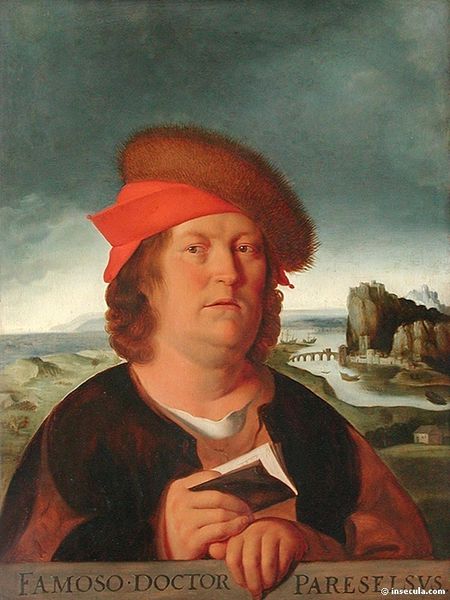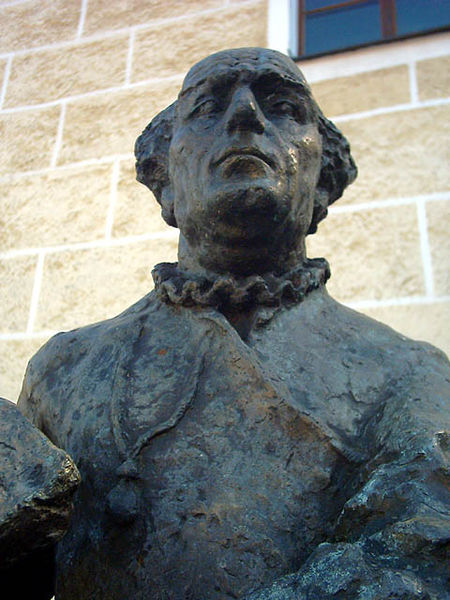<Back to Index>
- Physician Phillippus Aureolus Theophrastus Bombastus von Hohenheim (Paracelsus), 1493
- Painter Frans Snijders, 1579
- King of Castilla Alfonso VIII, 1155
PAGE SPONSOR


Paracelsus (born Phillippus Aureolus Theophrastus Bombastus von Hohenheim, 11 November or 17 December 1493 in Einsiedeln – 24 September 1541 in Salzburg) was a Renaissance physician, botanist, alchemist, astrologer, and general occultist. "Paracelsus", meaning "equal to or greater than Celsus", refers to the Roman encyclopedist Aulus Cornelius Celsus from the first century known for his tract on medicine. He is also credited for giving zinc its name, calling it zincum and is regarded as the first systematic botanist.
Paracelsus was born and raised in the village of Einsiedeln in Switzerland. His father, Wilhelm Bombast von Hohenheim, was a Swabian chemist and physician; his mother was Swiss. As a youth he worked in nearby mines as an analyst. At the age of 16 he started studying medicine at the University of Basel, later moving to Vienna. He gained his doctorate degree from the University of Ferrara.
His wanderings as an itinerant physician and sometime journeyman miner took him through Germany, France, Spain, Hungary, the Netherlands, Denmark, Sweden and Russia.
As a physician of the early 16th Century, Paracelsus held a natural affinity with the Hermetic, neoplatonic, and Pythagorean philosophies central to the Renaissance, a world view exemplified by Marsilio Ficino and Pico della Mirandola. Paracelsus rejected the magic theories of Agrippa and Flamel in his Archidoxes of Magic. Astrology was a very important part of Paracelsus' medicine, and he was a practicing astrologer -- as were many of the university trained physicians working at this time in Europe. Paracelsus devoted several sections in his writings to the construction of astrological talismans for curing disease, providing talismans for various maladies as well as talismans for each sign of the Zodiac. He also invented an alphabet called the Alphabet of the Magi, for engraving angelic names upon talismans.
Paracelsus pioneered the use of chemicals and minerals in medicine. He used the name "zink" for the element zinc in about 1526, based on the sharp pointed appearance of its crystals after smelting and the old German word "zinke" for pointed. He used experimentation in learning about the human body. Paracelsus was also responsible for the creation of laudanum, an opium tincture very common until the 19th century.
Paracelsus gained a reputation for being arrogant, and soon garnered the anger of other physicians in Europe. He held the chair of medicine at the University of Basel for less than a year; while there his colleagues became angered by allegations that he had publicly burned traditional medical books. He was forced from the city after having legal trouble over a physician's fee he sued to collect.
He then wandered Europe, Africa and Asia Minor, in the pursuit of hidden knowledge. He revised old manuscripts and wrote new ones, but had trouble finding publishers. In 1536, his Die grosse Wundartznei (The Great Surgery Book) was published and enabled him to regain fame. Paracelsus' life is connected to the birth of Lutheranism, and his opinions on the nature of the universe are better understood within the context of the religious ideas circulating during his lifetime.
He died at the age of 48 because of natural causes, and his remains were buried according to his wishes in the cemetery at the church of St Sebastian in Salzburg. His remains are now located in a tomb in the porch of the church.
After his
death, the movement of Paracelsianism was seized upon by many
wishing to subvert the traditional Galenic physics, and thus did his
therapies become more widely known and used. His motto was "Alterius non sit qui
suus esse potest" which means "Let no man that can belong to himself be
of another". Paracelsus
believed in the Greek concept of the four elements,
but he also introduced the idea that, on another level, the cosmos was
fashioned from three spiritual substances: the tria prima of Mercury, Sulfur and Salt. These substances were not the
simple substances we recognize today, but were rather broad principles that
gave every object both its inner essence and outward form. Mercury
represented the transformative agent (fusibility and volatility);
Sulfur represented the binding agent between substance and
transformation (flammability); and Salt represented the
solidifying/substantiating agent (fixity and noncombustibility). For
example, when a piece of wood is burnt, the products reflect its
constitution: Smoke reflects Mercury, flame reflects Sulfur, and Ash
reflects Salt.
The tria prima also
defined the human identity. Sulfur embodied the soul, (the emotions and
desires); Salt represented the body; Mercury epitomized the spirit
(imagination, moral judgment, and the higher mental faculties). By
understanding the chemical nature of the tria prima, a
physician could discover the means of curing disease. Paracelsus
pioneered the use of chemicals and minerals in medicine. His hermetical views were that sickness
and health in the body relied on the harmony of man (the microcosm) and
Nature (macrocosm).
He took an approach different from those before him, using this analogy
not in the manner of soul purification but in the manner that humans
must have certain balances of minerals in their bodies, and that
certain illnesses of the body had chemical remedies that could cure
them. As
a result of this hermetical idea of harmony, the universe's macrocosm
was represented in every person as a microcosm. According to the
insights at the time, there were Seven planets on the sky, Seven metals
on Earth and Seven centers (or major organs) in Man — seven was a
special number. Everything was heavenly and closely interrelated. Diseases
were caused by poisons brought here from the stars. But 'poisons' were
not necessarily something negative, in part because related substances
interacted, in part because only the dose determined if a substance was
poisonous or not. Evil could expel evil. Therefore, poisons could have
beneficial medical effects. Because everything in the universe was
interrelated, beneficial medical substances could be found in herbs,
minerals and various alchemical combinations hereof. Paracelsus viewed
the universe as one coherent organism pervaded by a uniting lifegiving
spirit, and this in its entirety, Man included, was 'God'. His views
put him at odds with the Church, for whom there necessarily had to be a
difference between the Creator and the created. He
summarized his own views: "Many have said of Alchemy, that it is for
the making of gold and silver.
For me such is not the aim, but to consider only what virtue and power
may lie in medicines." Hippocrates put forward the theory that
illness was caused by an imbalance of the four humours:
blood, phlegm, black bile and yellow bile. These ideas were further
developed by Galen into
an extremely influential and highly persistent set of medical beliefs
that were to last until the mid 1850s. The dominant medical treatments
at Paracelsus' time were specific diets to help in the "cleansing of
the putrefied juices" combined with purging and bloodletting to
restore the balance of the four humours. Paracelsus supplemented and
challenged this view with his beliefs that illness was the result of
the body being attacked by outside agents. Paracelsus'
major work On the
Miners' Sickness and Other Diseases of Miners documented
the occupational hazards of metalworking including treatment and
prevention strategies. He also wrote a book on the human body
contradicting Galen's
ideas. Paracelsus, sometimes called the father of toxicology,
wrote:
Or, more
commonly That
is to say, substances considered toxic are harmless in small doses, and
conversely an ordinarily harmless substance can be deadly if
over consumed. Even water can be deadly if over consumed. Paracelsus
is credited as providing the first clinical/scientific mention of the unconscious.
In his work Von den
Krankeiten he
writes: "Thus, the cause of the disease chorea lasciva is a mere
opinion and idea, assumed by imagination, affecting those who believe
in such a thing. This opinion and idea are the origin of the disease
both in children and adults. In children the case is also imagination,
based not on thinking but on perceiving, because they have heard or
seen something. The reason is this: their sight and hearing are so
strong that unconsciously they have fantasies about what they have seen
or heard." Paracelsus
is claimed by the Fraternitas
Rosae Crucis to
be the true identity of the mythical alchemist Christian
Rosenkreutz who was
the major figure in the Fama
Fraternitatis published
in 1614 in Germany, which at the time caused excitement throughout
Europe by declaring the existence of a secret brotherhood of alchemists
and sages who were preparing to transform the arts, sciences, religion,
and political and intellectual landscape of Europe while wars of
politics and religion ravaged the continent. Divergent views believe
Rosenkreuz to be a pseudonym for a more famous historical figure like Francis Bacon. Many
books mentioning Paracelsus also cite him as the origin of the word
"bombastic" to describe his often arrogant speaking style, which the
following passage illustrates: I am
Theophrastus, and greater than those to whom you liken me; I am
Theophrastus, and in addition I am monarcha medicorum and
I can prove to you what you cannot prove... I need not don a coat of
mail or a buckler against you, for you are not learned or experienced
enough to refute even a word of mine... As for you, you can defend your
kingdom with belly-crawling and flattery. How long do you think this
will last?... Let me tell you this: every little hair on my neck knows
more than you and all your scribes, and my shoe buckles are more
learned than your Galen and Avicenna, and my beard has more experience
than all your high colleges. – Paracelsus, Selected Writings However,
according to the Oxford English
Dictionary,
the origin of the word "bombastic" is not a play on Paracelsus's middle
name, Bombastus. Instead, that dictionary cites "bombast": an old term
for cotton stuffing.